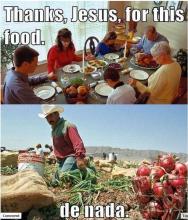Food
Over at Think Progress, Scott Keys reports on Rep. Allen West's latest comments:
"West, speaking at the Broward County Lincoln Day Dinner this past Saturday, warned the crowd about the danger of food stamps for American society. “In the last 10 years,” West said, the “food stamp program that has gone from about $20.6 billion to over $75 billion.” The Florida congressmen saw this increase not as a society practicing compassion for its most needy, but as a more nefarious plot. “That’s not how you empower the American people,” West declared. “That’s how you enslave the American people.”
Read the full article here
IT’S EASY to make the assumption that obesity is an individual problem, having more to do with personal health than with social justice. After all, people make their own decisions about what they put on their plates and how much they put in their mouths.
But many people—and many churches—are starting to see not only the public health consequences of the obesity epidemic, but also the broader forces that contribute to it.
And “epidemic” isn’t too strong a word for the growing problem of obesity. The numbers in the U.S. are unsettling, with startling increases over the past few decades. But the worst may be yet to come, as billions of people in formerly developing countries are gradually globalized into “fast-food nation” lifestyles.
The transition has already begun. According to a recent U.N. report, more than 1 billion people around the world are overweight. Each year excess weight and obesity cause 2.8 million deaths—65 percent of the world’s population now lives in countries where being overweight kills more people than being underweight. And it’s only going to get worse: According to Olivier De Schutter, the U.N. special rapporteur on the right to food, by 2030 as many as 5.1 million people in poor countries will die each year before the age of 60 from unhealthy diets and diet-related diseases such as diabetes, 1.3 million more than today.
The definitions of hunger and malnutrition are changing, and as a result so are the responses—but perhaps not quickly enough.
Food-related coverage in this issue was supported by ELCA World Hunger (www.elca.org/hunger)
IS OBESITY a “Southern thing,” like drawling accents, gospel music, and excessive devotion to college football? Well, as a native Southerner, I have to admit that increasingly it looks that way.
Obesity is, of course, a national problem. In 1990, 34 states had obesity rates between 10 and 14 percent, but no state had a 15 percent obesity rate. By 2010 every state in the country was more than 20 percent obese.
According to the Centers for Disease Control (CDC), as of 2010 there were 12 states with obesity rates of more than 30 percent. All but one of them are in the South, and that one exception—Michigan—may blame its problem on the many Southern migrants it received during the 1950s and ’60s. And the closer you look, the worse the picture gets. The highest concentrations of obesity were found in six states: Alabama, Louisiana, Mississippi, and South Carolina in the Deep South, and the largely Appalachian states of Kentucky and West Virginia.
The causes of obesity are the same for everyone. You eat too much, you don’t get enough exercise, and you become obese. But why do people eat too much and move too little? As for any human behavior, the causes are complex and ambiguous, but the timing of the obesity outbreak suggests some answers. The upward trend in obesity began in the 1980s and ’90s, when cable TV became widespread in American households, encouraging a couch-potato lifestyle. This was also when the two-income family became the norm. With both parents working full-time, home-cooked meals were often replaced by fat-laden fast-food dinners washed down with giant servings of sugary soda pop. In the subsequent two decades, both of these trends accelerated, with widespread internet access making physical activity even rarer.
Food-related coverage in this issue was supported by ELCA World Hunger (www.elca.org/hunger)
“Lord, you are good to all and compassionate toward all you’ve made ... You are faithful in all your words, and gracious in all your deeds. The eyes of all look to you in hope, and you give them their food in due season” (Psalm 145:9, 13, 15).
I often reflect on this message from Psalm 145 and how each of us will interpret it differently according to the experiences we’ve had in life. This is true even for the things in life that connect and affect us all.
Take, for example, God’s gift of food. We are interconnected by this thing that was created to nourish our bodies and minds, allowing us to function in our daily lives and permitting us to live a full and healthy life. Yet how often do we think about where the food we eat comes from?
When I’m at the store, I often wonder whose hands cultivated and cared for the plants that produced the piles of neatly stacked fruit and vegetables. Was it a Lupe, a Daniel, or a Jesus? How long did they have to work under the blazing hot sun in order to get the produce to the store? What are their stories and where do they come from?
I think about these things because I grew up with people who worked long, hard hours to produce the best quality of fruit for the market. Since I was very young, my immediate family has been immersed in agricultural work. My mother was a farm worker who picked fruit and vegetables. Once we children were old enough, we joined my mom and the rest of the labor force, which was mainly comprised of immigrant farm laborers. In the 19 years I’ve been around this work, rarely have I seen a non-immigrant hand in the orchards, and if I did, it surely wasn’t to help pick the fruit in bags that weigh up to 45 pounds.
IN THE U.S. food supply chain, 20 million workers labor in hazardous conditions for low wages. Uylonda Dickerson was one of them. Dickerson, a 39-year-old single African-American mother in Will County, Illinois, would show up every morning, hoping for work, at one of the many warehouses that litter the landscape of her area southwest of Chicago.
The Chicago region, once a proud steel and manufacturing hub, is now a major portal for food and other commodities produced cheaply overseas, transported by rail from West Coast ports, and slated for destinations in the Midwest or on the East Coast. Ironically, the workers—more than 80 percent of whom are African American or Latino—who were displaced from good, union jobs when factories closed are now employed in bad, temporary jobs, moving goods made in China.
The warehousing and storage industry, which feeds big-box retailers such as Walmart, relies on a pool of temporary laborers. This exempts employers from paying living wages or providing basic benefits and workers’ compensation; it also short-circuits worker attempts to organize into a union. Their costs of living are then displaced onto society. One in four warehouse workers relied on public assistance to survive, according to Warehouse Workers for Justice’s report “Bad Jobs in Goods Movement.”
On days when there was work, Dickerson was not paid an hourly rate, but by how many trailers she unloaded. She was sexually harassed by male colleagues and harangued by her supervisors for taking bathroom breaks. The job took a physical toll: “My body still is not the same,” she told a Huffington Post reporter. “I still have aches and I still have pains. I have migraines because of the stress I went through.”
I just discovered I've been duped.
This is painful, because I like to think I know how to read labels. I also like to trust products named Aunt Millie and stores named Whole Foods.
Alas, I forgot one of my basic shopping principles: Never trust food that calls itself "natural."
In label language, natural means nothing at all. Companies who use the term in their marketing are usually trying to hide something. I should have looked more carefully at Aunt Minnie's Hearth Fiber for Life 12 Whole Grains bread.
Here, I'll show you the inset up close. I read it as "100% natural whole grain," never stopping to wonder why the marketers bothered to point out that whole grains are natural (isn't that obvious?). But no. This bread is not 100% whole grain. It is 100% natural, whatever that means, and it contains whole grains. Twelve of them, in fact. But its third listed ingredient, after water and whole grain wheat flour, is unbleached wheat flour.

SALT LAKE CITY — At the new Utah Bishops' Central Storehouse, pallets loaded with food wait to be ferried to locales near and far, their destinations handwritten in black marker on plastic wrap covers: Lindon, Ely, Mesa, San Diego, St. George.
Storehouse manager Richard Humpherys stops a golf cart next to one steel storage rack, slits open a cardboard box with a pocket knife and pulls out a can of peaches made with fruit grown at a Mormon church-owned orchard and processed at its cannery in Lindon, Utah. The can's label is stamped "The Church of Jesus Christ of Latter-day Saints" and "Welfare Services, Salt Lake City, Utah."
If you want utterly flawless no-knead bread, use the New York Times recipe. But if you want something extremely good and a lot less persnickety to make, try this recipe. It’s extremely popular around the Sojourners offices and, in honor of Sojourners magazine’s May 2012 issue about food justice, from farm to table, we’re bringing it to you!
Students protest cafetera food, the art of snowboarding in LED, one man a capella showtunes, spoof street artist Hanksy, and more! Plus, an Animal Extravaganza: Maddie the Coonhound travels the country, remarkable footage of some of the world's strangest creatures, and fashioning an animalistic hair style. All this and more ... inside the blog.
Over the Rhine's husband/wife duo talks music and life together, old CDs are turned into remarkable animal sculptures, Chipotle takes new strides toward humane practices, a spark of fun in family pictures, restaurant serves edible balloons for dessert... and Disney's Lady and the Tramp is given new life. All this and more ... inside the blog.
A look at Poster Cred, the Seattle-based art project, Jesse Eisenberg shares his favorite memories of growing up with Jeremy Lin, "Food Rules," by Michael Pollan is born in stop animation, the new film from the writer of Slumdog Millionaire, and Allen Ginsberg vs. the Westminster Dog Show. All this and even more awesomeness... inside the blog.
Taking a look at Valentines Day with clever recipes, cards, stories, and clothing items. Videos of love across language barriers. A couple of sentimental mixtapes. The greatest kisses in literature. And finally, nothing says romance like a tour of an NYC sweage plant.
Improv Everywhere celebrates its tenth anniversary by remixing and remastering some of its best sketches. The highlights from Puppy Bowl VIII are in (look out for the MVP)! Bon Iver puts on an incredible SNL performance. Bill Maher's "Irritable Bowl Syndrome." Mad Men's promo posters have been tampered with! OK GO's latest music video from the inside of a car. A new look at Downton Abbey and more!
A huge collection of 90s pop classics set to the tune of one man's melodica, animals appearing everywhere -- in public libraries, photobombs, even to predict the superbowl, how to mount a hot pocket holder to your X-Box controller, the first installment of FRIDAY'S HIGH FIVE, and more!

Beyond the typical objections that the Harry Potter books will turn children into Satan-worshipers and encourage them to disrespect authority, one mom complained that she found it inappropriate that at Hogwarts food magically appears on the table at mealtime. Her argument was that she wants her children to have a good work ethic and not to believe that anything in life is free. She wanted her girls to know that preparing meals is hard work and so would therefore be sheltering them from this absurd depiction of people getting something for nothing.
I think at the time I had to restrain myself from asking if she also banned her kids from hearing the story of the feeding on the 5,000 in Sunday school, but it was hard not to think about her objection a few months later as I read The Goblet of Fire and its subplot about house elves. As it revealed, food does not magically appear on the tables at Hogwarts, it is prepared by hardworking elves who in the wizarding world are generally kept as slaves.
Newt Gingrich now regularly refers to President Obama as the “Food Stamp President.” Why?
Since late 2007, caseloads for the program formerly known as Food Stamps (now called the Supplemental Nutrition Assistance Program -- SNAP) have risen sharply.
These numbers are significant; about 14.2 million more people have started receiving benefits under President Obama. Still, this is just behind the record number of 14.7 million additional recipients added under President George W. Bush.
So, what’s the significance? President Obama has had a lot shorter time in office than President Bush did, should we be worried?
When I look at the numbers, I’m not concerned about the growth of SNAP under President Obama, I’m surprised at it’s growth under President Bush.

Tweeting the Bible, designing the Bible. Choosing an ethical restaurant. Paper sculptures. Ron Swanson cookies. Whisker Wars!

Private Sector Adds 206,000 Jobs In November; Police Clear Occupy Camps In Los Angeles, Philly; Churches Help Occupy Movement Survive Crackdowns, Winter; Study: Even With More Kids In Poverty, Number Of Uninsured Children Fell 14 Percent Over 3 Years; Poverty Soars For Students In D.C., Montgomery County; Anonymous Iowa Christian Group Launches Attack On Gingrich; Should Fair Trade Certify Giants Like Nestle and Folger's?; Long Lines For Free Holiday Food Vouchers.
Yesterday, Congress passed the 2012 Agricultural Appropriations Bill or “minibus” as it has come to be called. The good news is that cuts to both national and international nutrition programs were not as severe as originally expected. The bad news is, poverty is still at record levels and there is still more we can do to help those in need.
Over the past few weeks, Sojourners activists have sent thousands of emails to Congress urging them not to cut poverty focused foreign aid. While that fight continues, the passage of this bill -- without any major cuts to vital programs for poor and hungry people -- is an important step.
